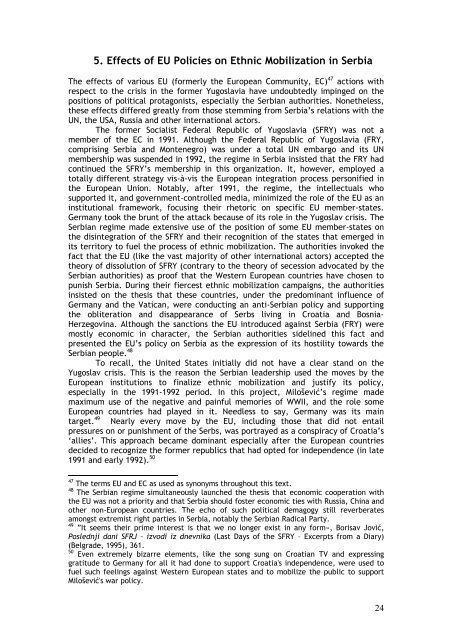Ethnic Mobilization in Serbia - EURAC
Ethnic Mobilization in Serbia - EURAC
Ethnic Mobilization in Serbia - EURAC
You also want an ePaper? Increase the reach of your titles
YUMPU automatically turns print PDFs into web optimized ePapers that Google loves.
5. Effects of EU Policies on <strong>Ethnic</strong> <strong>Mobilization</strong> <strong>in</strong> <strong>Serbia</strong><br />
The effects of various EU (formerly the European Community, EC) 47 actions with<br />
respect to the crisis <strong>in</strong> the former Yugoslavia have undoubtedly imp<strong>in</strong>ged on the<br />
positions of political protagonists, especially the <strong>Serbia</strong>n authorities. Nonetheless,<br />
these effects differed greatly from those stemm<strong>in</strong>g from <strong>Serbia</strong>’s relations with the<br />
UN, the USA, Russia and other <strong>in</strong>ternational actors.<br />
The former Socialist Federal Republic of Yugoslavia (SFRY) was not a<br />
member of the EC <strong>in</strong> 1991. Although the Federal Republic of Yugoslavia (FRY,<br />
compris<strong>in</strong>g <strong>Serbia</strong> and Montenegro) was under a total UN embargo and its UN<br />
membership was suspended <strong>in</strong> 1992, the regime <strong>in</strong> <strong>Serbia</strong> <strong>in</strong>sisted that the FRY had<br />
cont<strong>in</strong>ued the SFRY’s membership <strong>in</strong> this organization. It, however, employed a<br />
totally different strategy vis-à-vis the European <strong>in</strong>tegration process personified <strong>in</strong><br />
the European Union. Notably, after 1991, the regime, the <strong>in</strong>tellectuals who<br />
supported it, and government-controlled media, m<strong>in</strong>imized the role of the EU as an<br />
<strong>in</strong>stitutional framework, focus<strong>in</strong>g their rhetoric on specific EU member-states.<br />
Germany took the brunt of the attack because of its role <strong>in</strong> the Yugoslav crisis. The<br />
<strong>Serbia</strong>n regime made extensive use of the position of some EU member-states on<br />
the dis<strong>in</strong>tegration of the SFRY and their recognition of the states that emerged <strong>in</strong><br />
its territory to fuel the process of ethnic mobilization. The authorities <strong>in</strong>voked the<br />
fact that the EU (like the vast majority of other <strong>in</strong>ternational actors) accepted the<br />
theory of dissolution of SFRY (contrary to the theory of secession advocated by the<br />
<strong>Serbia</strong>n authorities) as proof that the Western European countries have chosen to<br />
punish <strong>Serbia</strong>. Dur<strong>in</strong>g their fiercest ethnic mobilization campaigns, the authorities<br />
<strong>in</strong>sisted on the thesis that these countries, under the predom<strong>in</strong>ant <strong>in</strong>fluence of<br />
Germany and the Vatican, were conduct<strong>in</strong>g an anti-<strong>Serbia</strong>n policy and support<strong>in</strong>g<br />
the obliteration and disappearance of Serbs liv<strong>in</strong>g <strong>in</strong> Croatia and Bosnia-<br />
Herzegov<strong>in</strong>a. Although the sanctions the EU <strong>in</strong>troduced aga<strong>in</strong>st <strong>Serbia</strong> (FRY) were<br />
mostly economic <strong>in</strong> character, the <strong>Serbia</strong>n authorities sidel<strong>in</strong>ed this fact and<br />
presented the EU’s policy on <strong>Serbia</strong> as the expression of its hostility towards the<br />
<strong>Serbia</strong>n people. 48<br />
To recall, the United States <strong>in</strong>itially did not have a clear stand on the<br />
Yugoslav crisis. This is the reason the <strong>Serbia</strong>n leadership used the moves by the<br />
European <strong>in</strong>stitutions to f<strong>in</strong>alize ethnic mobilization and justify its policy,<br />
especially <strong>in</strong> the 1991-1992 period. In this project, Milošević’s regime made<br />
maximum use of the negative and pa<strong>in</strong>ful memories of WWII, and the role some<br />
European countries had played <strong>in</strong> it. Needless to say, Germany was its ma<strong>in</strong><br />
target. 49 Nearly every move by the EU, <strong>in</strong>clud<strong>in</strong>g those that did not entail<br />
pressures on or punishment of the Serbs, was portrayed as a conspiracy of Croatia’s<br />
‘allies’. This approach became dom<strong>in</strong>ant especially after the European countries<br />
decided to recognize the former republics that had opted for <strong>in</strong>dependence (<strong>in</strong> late<br />
1991 and early 1992). 50<br />
47 The terms EU and EC as used as synonyms throughout this text.<br />
48 The <strong>Serbia</strong>n regime simultaneously launched the thesis that economic cooperation with<br />
the EU was not a priority and that <strong>Serbia</strong> should foster economic ties with Russia, Ch<strong>in</strong>a and<br />
other non-European countries. The echo of such political demagogy still reverberates<br />
amongst extremist right parties <strong>in</strong> <strong>Serbia</strong>, notably the <strong>Serbia</strong>n Radical Party.<br />
49 ”It seems their prime <strong>in</strong>terest is that we no longer exist <strong>in</strong> any form», Borisav Jović,<br />
Poslednji dani SFRJ – izvodi iz dnevnika (Last Days of the SFRY – Excerpts from a Diary)<br />
(Belgrade, 1995), 361.<br />
50 Even extremely bizarre elements, like the song sung on Croatian TV and express<strong>in</strong>g<br />
gratitude to Germany for all it had done to support Croatia's <strong>in</strong>dependence, were used to<br />
fuel such feel<strong>in</strong>gs aga<strong>in</strong>st Western European states and to mobilize the public to support<br />
Milošević's war policy.<br />
24

















